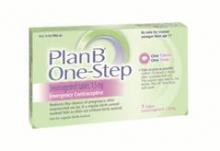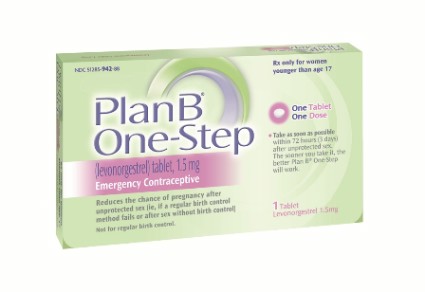User login
Plan B One-Step can now be purchased without a prescription by young women aged 15-16 years so long as they can verify their age, the Food and Drug Administration announced April 30.
Previously, only women 17 years or older could purchase Teva’s one-dose levonorgestrel emergency contraceptive under those conditions; others needed a prescription.
Plan B One-Step (levonorgestrel tablet, 1.5 mg, for oral use) "will be packaged with a product code prompting a cashier to request and verify the customer’s age. A customer who cannot provide age verification will not be able to purchase the product," according to the FDA announcement.
The product will be available in the family planning or women’s health aisles of stores that have a pharmacy and will be accessible "whether the pharmacy is open or not," the statement continued.
The agency also said that this approval is unrelated to an April 5 U.S. District Court order that gave it 30 days to grant emergency contraception full OTC status.
Specifically, the court ordered the FDA "to grant a 2001 citizen’s petition ... that sought to allow over-the-counter access to Plan B [a two dose levonorgestrel product] for women of all ages and/or make Plan B One-Step available without age or point of sale restrictions," the agency said.
However, Teva had a pending application to market Plan B One-Step to women 15 years and older prior to the ruling. According to the FDA, approval of the Plan B One-Step "is independent of that litigation and this decision is not intended to address the judge’s ruling. The Department of Justice is considering next steps in the litigation. In the meantime, the FDA took independent action to approve the pending application on Plan B One-Step."
The Center for Reproductive Rights, a plaintiff to the lawsuit that led to the ruling, said in a statement that "lowering the age restriction to 15 for over-the-counter access to Plan B One-Step may reduce delays for some young women, but it does nothing to address the significant barriers that far too many women of all ages will still find if they arrive at the drugstore without identification or after the pharmacy gates have been closed for the night or weekend."
Planned Parenthood noted in its statement, "While we fully support this expansion of access to birth control, we continue to believe that the administration should lift all unnecessary restrictions to emergency contraception, consistent with the prevailing science and medicine."
"We really would like no age restriction," said spokeswoman Kristen Glundberg-Prossor. "If you really need [emergency contraception], you need to have easy access to it. Anytime you have these age restrictions on a drug, they create a lot of confusion."
The confusion could get worse since Plan B One-Step and the original Plan B now have different age requirements for OTC access, in addition to different dosing schedules despite similar-sounding names. The original product remains indicated without a prescription for women aged 17 years or older.
Meanwhile, it’s unknown if the Department of Health and Human Services will contest the court ruling, and there’s a third emergency contraceptive, Ella, that is available only by prescription.
"Confusion usually winds up reducing access" as pharmacists, unsure of the rules, err on the side of caution, said Dr. Eve Espey, associate professor of obstetrics and gynecology at the University of New Mexico, Albuquerque.
But it’s important to remember that, overall, "access to emergency contraception is being liberalized and hopefully will continue to get easier for women. Talking to women about emergency contraception and continuing to advocate for increased access [both] remain really important," she said.
Teva plans an education campaign to bring consumers, pharmacy staff, and health care providers up to speed with Plan B One-Step’s new age rules, the FDA said.
Dr. Espey said that she had no financial conflicts of interest.
Plan B One-Step can now be purchased without a prescription by young women aged 15-16 years so long as they can verify their age, the Food and Drug Administration announced April 30.
Previously, only women 17 years or older could purchase Teva’s one-dose levonorgestrel emergency contraceptive under those conditions; others needed a prescription.
Plan B One-Step (levonorgestrel tablet, 1.5 mg, for oral use) "will be packaged with a product code prompting a cashier to request and verify the customer’s age. A customer who cannot provide age verification will not be able to purchase the product," according to the FDA announcement.
The product will be available in the family planning or women’s health aisles of stores that have a pharmacy and will be accessible "whether the pharmacy is open or not," the statement continued.
The agency also said that this approval is unrelated to an April 5 U.S. District Court order that gave it 30 days to grant emergency contraception full OTC status.
Specifically, the court ordered the FDA "to grant a 2001 citizen’s petition ... that sought to allow over-the-counter access to Plan B [a two dose levonorgestrel product] for women of all ages and/or make Plan B One-Step available without age or point of sale restrictions," the agency said.
However, Teva had a pending application to market Plan B One-Step to women 15 years and older prior to the ruling. According to the FDA, approval of the Plan B One-Step "is independent of that litigation and this decision is not intended to address the judge’s ruling. The Department of Justice is considering next steps in the litigation. In the meantime, the FDA took independent action to approve the pending application on Plan B One-Step."
The Center for Reproductive Rights, a plaintiff to the lawsuit that led to the ruling, said in a statement that "lowering the age restriction to 15 for over-the-counter access to Plan B One-Step may reduce delays for some young women, but it does nothing to address the significant barriers that far too many women of all ages will still find if they arrive at the drugstore without identification or after the pharmacy gates have been closed for the night or weekend."
Planned Parenthood noted in its statement, "While we fully support this expansion of access to birth control, we continue to believe that the administration should lift all unnecessary restrictions to emergency contraception, consistent with the prevailing science and medicine."
"We really would like no age restriction," said spokeswoman Kristen Glundberg-Prossor. "If you really need [emergency contraception], you need to have easy access to it. Anytime you have these age restrictions on a drug, they create a lot of confusion."
The confusion could get worse since Plan B One-Step and the original Plan B now have different age requirements for OTC access, in addition to different dosing schedules despite similar-sounding names. The original product remains indicated without a prescription for women aged 17 years or older.
Meanwhile, it’s unknown if the Department of Health and Human Services will contest the court ruling, and there’s a third emergency contraceptive, Ella, that is available only by prescription.
"Confusion usually winds up reducing access" as pharmacists, unsure of the rules, err on the side of caution, said Dr. Eve Espey, associate professor of obstetrics and gynecology at the University of New Mexico, Albuquerque.
But it’s important to remember that, overall, "access to emergency contraception is being liberalized and hopefully will continue to get easier for women. Talking to women about emergency contraception and continuing to advocate for increased access [both] remain really important," she said.
Teva plans an education campaign to bring consumers, pharmacy staff, and health care providers up to speed with Plan B One-Step’s new age rules, the FDA said.
Dr. Espey said that she had no financial conflicts of interest.
Plan B One-Step can now be purchased without a prescription by young women aged 15-16 years so long as they can verify their age, the Food and Drug Administration announced April 30.
Previously, only women 17 years or older could purchase Teva’s one-dose levonorgestrel emergency contraceptive under those conditions; others needed a prescription.
Plan B One-Step (levonorgestrel tablet, 1.5 mg, for oral use) "will be packaged with a product code prompting a cashier to request and verify the customer’s age. A customer who cannot provide age verification will not be able to purchase the product," according to the FDA announcement.
The product will be available in the family planning or women’s health aisles of stores that have a pharmacy and will be accessible "whether the pharmacy is open or not," the statement continued.
The agency also said that this approval is unrelated to an April 5 U.S. District Court order that gave it 30 days to grant emergency contraception full OTC status.
Specifically, the court ordered the FDA "to grant a 2001 citizen’s petition ... that sought to allow over-the-counter access to Plan B [a two dose levonorgestrel product] for women of all ages and/or make Plan B One-Step available without age or point of sale restrictions," the agency said.
However, Teva had a pending application to market Plan B One-Step to women 15 years and older prior to the ruling. According to the FDA, approval of the Plan B One-Step "is independent of that litigation and this decision is not intended to address the judge’s ruling. The Department of Justice is considering next steps in the litigation. In the meantime, the FDA took independent action to approve the pending application on Plan B One-Step."
The Center for Reproductive Rights, a plaintiff to the lawsuit that led to the ruling, said in a statement that "lowering the age restriction to 15 for over-the-counter access to Plan B One-Step may reduce delays for some young women, but it does nothing to address the significant barriers that far too many women of all ages will still find if they arrive at the drugstore without identification or after the pharmacy gates have been closed for the night or weekend."
Planned Parenthood noted in its statement, "While we fully support this expansion of access to birth control, we continue to believe that the administration should lift all unnecessary restrictions to emergency contraception, consistent with the prevailing science and medicine."
"We really would like no age restriction," said spokeswoman Kristen Glundberg-Prossor. "If you really need [emergency contraception], you need to have easy access to it. Anytime you have these age restrictions on a drug, they create a lot of confusion."
The confusion could get worse since Plan B One-Step and the original Plan B now have different age requirements for OTC access, in addition to different dosing schedules despite similar-sounding names. The original product remains indicated without a prescription for women aged 17 years or older.
Meanwhile, it’s unknown if the Department of Health and Human Services will contest the court ruling, and there’s a third emergency contraceptive, Ella, that is available only by prescription.
"Confusion usually winds up reducing access" as pharmacists, unsure of the rules, err on the side of caution, said Dr. Eve Espey, associate professor of obstetrics and gynecology at the University of New Mexico, Albuquerque.
But it’s important to remember that, overall, "access to emergency contraception is being liberalized and hopefully will continue to get easier for women. Talking to women about emergency contraception and continuing to advocate for increased access [both] remain really important," she said.
Teva plans an education campaign to bring consumers, pharmacy staff, and health care providers up to speed with Plan B One-Step’s new age rules, the FDA said.
Dr. Espey said that she had no financial conflicts of interest.

